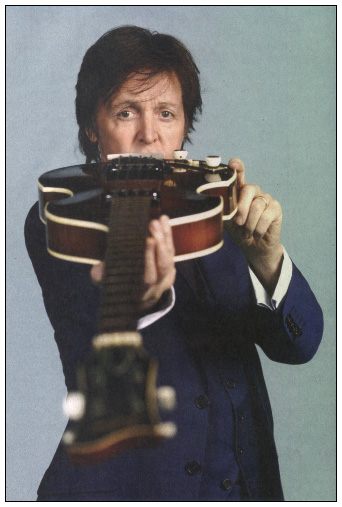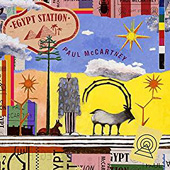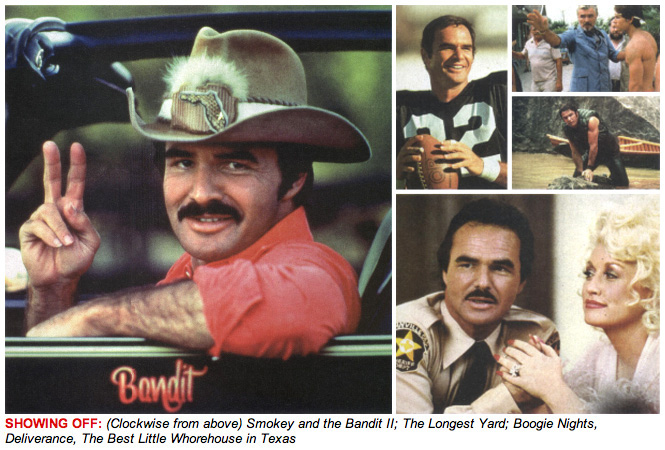![]()
| Station to Station |
|
![]()
On his best album in years, Paul McCartney envisions each song a stop at its own unique train station.
Paul McCartney
Egypt Station
Capitol
ROCK
By Leah Greenblatt in Entertainment Weekly

![]() f Paul McCartney keeps a bucket list, what could possibly be left on it? A walk on the moon, maybe, or the prototype for eternal life, graciously bestowed by some bleeding-edge biotech lab in Silicon Valley in return for services rendered to mankind.
f Paul McCartney keeps a bucket list, what could possibly be left on it? A walk on the moon, maybe, or the prototype for eternal life, graciously bestowed by some bleeding-edge biotech lab in Silicon Valley in return for services rendered to mankind.
There are only so many new adventures, after all, for a living legend already guaranteed a forever place on the face of rock's Mount Rushmore; an artist knighted, canonized, and adored in nearly every obscure corner of the globe for more than have a century. And yet, in public and on record, he is somehow still everybody's Paul -- the scrappy kid from Liverpool who appeared on a special hometown edition of "Carpool Karaoke" this past June, contentedly tootling his harmonica in an empty bus shelter, playing a surprise greatest-hits set at a local pub, and making James Corden cry for his grandpa in the middle of a "Let It Be" duet.

|
In the press notes, McCartney extols the virtues of "the 'album' albums we used to make," and Station has a loose jukebox quality that still feels thematic, even as he moves through moods and sounds. The modern-magpie sensibility of Grammy-winning producer Greg Kurstin (Adele, Beck) gilds the handclap chorus of exalted piano anthem "Fuh You," while jaunty sing-along "People Want Peace" rips a page directly from John Lennon's bed-in playbook. The delicate, pirouetting "Hand in Hand" comes on like a bittersweet "Blackbird" redux; breezy bossa nova shuffle "Back in Brazil" feels like something David Byrne might turn out on a sunny São Paulo weekend. And "Caesar Rock" is all early Hamburg sessions, a giddy shout from the basement of a garage-band jam.
The song list contains 16 tracks total, counting its bookending instrumentals, and it's a long shot, probably, that any of them will join the pantheon. As with any artist of McCartney's age and caliber, the specter of an iconic catalog can't help but hang over the current work, particularly when so few like him remain. For some of his peers, that sense of legacy tended to become the locus of the material, or at least a heavy subtext; on their elegiac late-career albums, Leonard Cohen and David Bowie grappled with mortality and loss in a way that felt in many ways like a deliberate farewell.
But for all its reflection, Station (recorded in part at Abbey Road) feels like the output of a man still experiencing life midstream. And while McCartney has undergone a kind of pop culture resurgence over the past decade -- duetting with Kanye and Rihanna, drumming for the Foo Fighters, dancing in the VIP balcony at Beyoncé's gigs -- he's done it all with a sort of serene elder-statesman dignity. There's no sense on this record that he needs to pander to the kids; no Drake cameo or strenuously pop-charty production.
Instead, the album is content to mine the Technicolor mind of its creator: alternately playful and earnest, melancholy and resilient, but always immutably himself -- the still-vital life force of a superstar who has been there and everywhere and is glad just to be here now. B+ ![]()

| So Long, Bandit |
|
![]()
One of the biggest box office stars of the '70s and '80s drives off into the sunset.
By Chris Nashawaty in Entertainment Weekly

![]() urt Reynolds, the macho movie star with a self-depreciating sense of humor and a string of box office hits in the '70s and '80s, followed by an Oscar-nominated comeback in 1997's Boogie Nights, passed away on Sept. 6 in Florida. He was 82. Over the course of his six-decade career, Reynolds lent his easy charisma and smoldering good looks to countless memorable roles. Here are 11 of his most indelible ones.
urt Reynolds, the macho movie star with a self-depreciating sense of humor and a string of box office hits in the '70s and '80s, followed by an Oscar-nominated comeback in 1997's Boogie Nights, passed away on Sept. 6 in Florida. He was 82. Over the course of his six-decade career, Reynolds lent his easy charisma and smoldering good looks to countless memorable roles. Here are 11 of his most indelible ones.
GUNSMOKE 1962 - 1965
After signing a $125-a-week contract with Universal in 1958 (alongside another up-and-comer named Clint Eastwood), Reynolds got his big break as the part-Native American blacksmith Quint Asper on the long-running CBS Western.
DELIVERANCE 1972
John Boorman's harrowing man-vs.-nature adventure turned Reynolds into an A-list star. The actor is electric as Lewis Medlock, the alpha in a group of male buddies on a canoeing trip that turns into a nightmare.
THE LONGEST YARD 1974
Once a star tailback at Florida State, Reynolds tapped into his passion for football as Paul Crewe, an incarcerated quarterback who leads a team of cons against a squad of guards on the gridiron.
This is where Burt Reynolds: Actor/Comedian/Stud becomes Burt Reynolds: Icon. Hal Neeham's redneck caper (which spawned two sequels) was an instant smash, in no small part due to Reynolds' on- and offscreen sparks with costar Sally Field.
TABLOID STAPLE 1970s - 1990s
Reynolds was just as famous (or infamous) for his high-profile romances with Field and Dinah Shore (who was 20 years his senior), his tumultuous, scandal-sheet marriage to Loni Anderson, and his 1972 centerfold in Cosmopolitan, in which the heartthrob wore nothing but a grin on a bearskin rug almost as hairy as his chest.
THE CANNONBALL RUN 1981
 If you were remotely famous in 1981, chances are you were in this cross-country, laughing-gas road rally. But it's Reynolds and loyal sidekick Dom Deluise who steal the show.
If you were remotely famous in 1981, chances are you were in this cross-country, laughing-gas road rally. But it's Reynolds and loyal sidekick Dom Deluise who steal the show.
SHARKY'S MACHINE 1981
In what may be his mot underrated and grittiest movie ever (he directed it, too), Reynolds plays a Dirty Harry-esque vice cop who descends into Atlanta's underworld to catch a Mob boss.
THE BEST LITTLE WHOREHOUSE IN TEXAS 1982
Often unfairly criticized for playing only one character, Reynolds silenced naysayers by singing on screen with Dolly Parton in this fizzy adaptation of the hit Broadway musical.
EVENING SHADE 1990 - 1994
When movie parts dried up, Reynolds returned to TV for 98 episodes of Linda Bloodworth-Thomason's CBS sitcom about a retired football pro who becomes a high school coach in his Arkansas hometown.
BOOGIE NIGHTS 1997
Reynolds and director Paul Thomas Anderson didn't jell during the making of this kaleidoscopic, coke-fueled porn-world epic, but the partnership brought out Reynolds' greatest performance, leading to his first and only Oscar nod.
THE LAST MOVIE STAR 2018
Writer-director Adam Rifkin tapped into Reynolds' highs and lows to add unexpected pathos to this valedictory, lion-in-winter drama about an aging actor reckoning with life after fame. ![]()
![]() Reader's Comments
Reader's Comments
No comments so far, be the first to comment.
